
Possible Worlds
Seiten
2003
Acumen Publishing Ltd (Verlag)
978-1-902683-69-0 (ISBN)
Acumen Publishing Ltd (Verlag)
978-1-902683-69-0 (ISBN)
Examines the ways in which possible worlds have been used as a framework for considering problems in logic and argument analysis. This book offers an introduction to the basic ideas of modal logic in terms of Saul Kripke's possible worlds and discusses 'possible for' and 'possible that'.
Ever since Saul Kripke and others developed a semantic interpretation for modal logic, 'possible worlds' has been a much debated issue in contemporary metaphysics. To propose the idea of a possible world that differs in some way from our actual world - for example a world where the grass is red or where no people exist - can help us to analyse and understand a wide range of philosophical concepts, such as counterfactuals, properties, modality, and of course, the notions of possibility and necessity. This book examines the ways in which possible worlds have been used as a framework for considering problems in logic and argument analysis. The book begins with a non-technical introduction to the basic ideas of modal logic in terms of Kripke's possible worlds and then moves on to a discussion of 'possible for' and 'possible that'. The central chapters examine questions of meaning, epistemic possibility, temporal logic, metaphysics, and impossibility. Girle also investigates how the idea of a possible world can be put to use in different areas of philosophy, the problems it may raise, and the benefits that can be gained.
Ever since Saul Kripke and others developed a semantic interpretation for modal logic, 'possible worlds' has been a much debated issue in contemporary metaphysics. To propose the idea of a possible world that differs in some way from our actual world - for example a world where the grass is red or where no people exist - can help us to analyse and understand a wide range of philosophical concepts, such as counterfactuals, properties, modality, and of course, the notions of possibility and necessity. This book examines the ways in which possible worlds have been used as a framework for considering problems in logic and argument analysis. The book begins with a non-technical introduction to the basic ideas of modal logic in terms of Kripke's possible worlds and then moves on to a discussion of 'possible for' and 'possible that'. The central chapters examine questions of meaning, epistemic possibility, temporal logic, metaphysics, and impossibility. Girle also investigates how the idea of a possible world can be put to use in different areas of philosophy, the problems it may raise, and the benefits that can be gained.
Rod Girle is Associate Professor of Philosophy at the University of Auckland.
Preface 1. Introduction 2. Possible worlds 3. Possible worlds and quantifiers 4. Possible worlds, individuals and identity 5. Possibility talk 6. The possible worlds of knowledge 7. The possible worlds of belief 8. Time and many possible worlds 9. Real possibility 10. Impossible possible worlds 11. Unfinished story Notes Bibliography Index
| Erscheint lt. Verlag | 30.6.2003 |
|---|---|
| Verlagsort | Durham |
| Sprache | englisch |
| Maße | 156 x 234 mm |
| Gewicht | 453 g |
| Themenwelt | Geisteswissenschaften ► Philosophie ► Logik |
| Geisteswissenschaften ► Philosophie ► Metaphysik / Ontologie | |
| ISBN-10 | 1-902683-69-2 / 1902683692 |
| ISBN-13 | 978-1-902683-69-0 / 9781902683690 |
| Zustand | Neuware |
| Informationen gemäß Produktsicherheitsverordnung (GPSR) | |
| Haben Sie eine Frage zum Produkt? |
Mehr entdecken
aus dem Bereich
aus dem Bereich


